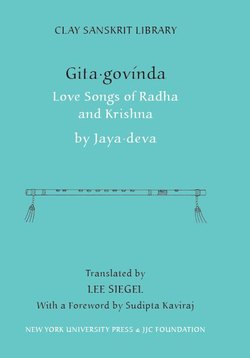Читать книгу Gita Govinda - Jayadeva - Страница 25
На сайте Литреса книга снята с продажи.
Оглавлениеhe himself says, a royal poet obeisant, literally “[bowing] at the feet of,” Padmavati. The word here used for “poet” (carana), an apt reference to the gandharvas who sing for the gods, is, not without some etymological justification, read in light of the hagiographies, as “wandering singer” or a “mendicant bard” who sings not “at the feet” of the goddess, but “for the feet” of the dancer, his wife.
In Song xxi, the poet proclaims that his songs please Padmavati. The fifteenth-century commentator Kumbha, paraphrastically explains the statement as a reference to a shrine in Kenduli village where Lakshmi is known as Padmavati, and where a young Jaya·deva pleased that goddess by worshipping her in his youth. By the sixteenth century, however, as evidenced by the commentary of Shankara Mishra, Padmavati had become Jaya·deva’s wife. The legends of the devoted married couple, the singer and the dancer, dedicated together to serving Krishna at the Jagannath Temple, had become an accepted history, a true story that legitimated the “Gita·govinda” as a liturgical text to be performed in song and dance for the deity as it still is each evening at that temple in Puri.
That the hallowed songs of the “Gita·govinda” would transport the sixteenth-century Vaishnava saint, Chaitanya, into ecstasies and beatitude, affording him epiphanies of Krishna, made the singing of them integral to the devo- tional practices of the Bengal Vaishnava movement. Ac- cording to the “Nectar of the Acts of Chaitanya” (Caitanya-caritamrta), as the saint sang the onomatopoetic and alliter- ative third song of the “Gita·govinda,” “lalita/lavanga/lata...,” Krishna, enchanted by its mellifluousness, appeared to ____________
